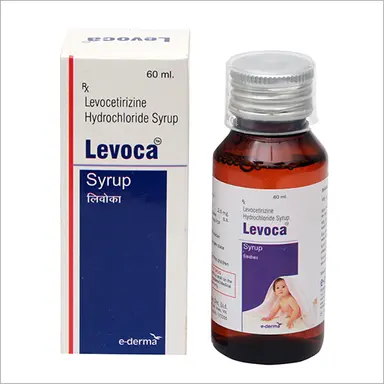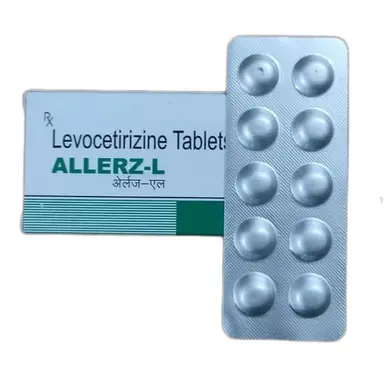All You Need to Know About Levocetirizine Syrup: Uses, Dosage, and Side Effects

Levocetirizine is a medication used to treat the skin itching and rash that comes with hay fever. Antihistamines work by blocking the affects of the naturally occurring chemical histamine in the human body. Itching, coughing, a runny nose, and watery eyes are all side effects of histamine.
Breathing can become challenging because the bronchial tubes become constricted. Some people who are sensitive to histamine develop hives, a skin condition characterized by intense itchiness.
If you have ever had any kind of reaction to levocetirizine syrup or any other medicines, you should definitely let your doctor know. If you have any other sensitivity besides those to foods, dyes, preservatives, or animals, be sure to let your doctor know. Be sure you know what you're getting before buying something over the counter.
Uses of Levocetirizine Syrup
Levocet Syrup can help with things like a stuffy or runny nose, coughing, and watery or itchy eyes. The rest of your day will run more smoothly as a result of this. It also helps reduce the rash, swelling, itching, and irritation associated with allergic responses to bug bites, hives, and eczema.
Your skin's look will improve, and you may also experience an uptick in disposition and assurance. Rarely will you experience severe adverse effects, and you may only need to take it on the days that your symptoms are present.
In addition, Levocet Syrup made by levocetirizine syrup manufacturers may have a smaller effect on sleepiness than other antihistamines. If you're taking it to avoid symptoms, you'll get the most out of it if you use it frequently.
Guidelines to use the syrup:
- Follow your doctor's instructions to a "T" when taking this medication. Do not increase your dosage, increase the frequency of your doses, or increase the duration of your treatment without first consulting your doctor. The possibility of unpleasant side effects increases if you do so.
- If you are using this medication without a doctor's prescription, make sure to read and follow all directions on the package.
- This medication can be taken either before or after meals.
- Make sure you use a properly marked measuring spoon, oral syringe, or medication cup when dosing the oral solution.
- You should take the pill by mouth. Your physician may advise you to split the pill in half if you need a half-dose.
Dosages of levocetirizine syrup
Each patient will require a unique dosage of this medication. Do as directed by your doctor or the instructions. Only typical recommendations for this medication's dosage are provided below. Do not adjust your dosage unless instructed to do so by your doctor.
The strength of your levocetirizine syrup price will determine how much of it you need to consume. The duration of treatment, the number of dosages taken daily, and the amount of time between doses all vary from one medical condition to the next.
Also Read: Allergy Medicine Manufacturing OTC Industry in India 2023
Dosages for hay fever:
- 12 year old children and adults can take 5-10 milliliters (ML) in a day in the evening. Avoid taking 10ml within 24 hours.
- 6-12 years of children can take 5ml in a day in the evening. Avoid taking 6-7 ml in a day.
- For 2 to 5 years old children, take 2.5ml in a day in the evening. Don’t take more than 2.5 ml and less than 2.5ml within 24 hours.
- For younger children 6-8 year of age, take the drop according to the prescription of the doctor.
For levocetirizine Dihydrochloride solution dosage form:
- Children and adults older than 3 yars of age can take 5 milligram (mg) and 10 milliliters (ML) iin a day in the evening.
- 6 months to 2 years old children can take 1.25 mg or 2.5 ml ½ teaspoon syrup in a day in the evening. Keep in mind the doctor’s prescription before taking the drop.
- 6 months children can use and doest according to the doctors prescription.
For Oral Dosage:
- 12 years age adults and children can take 5 milligrams tablet in a day in the evening. Plus, some can take 2.5 mg tablet in day in the evening. Avoid using more than 5mg once a day.
- Children 6 to 12 years of old can 2.5 mg (1/2 tablet) in a day in the evening. Avoid using more than 2.5 milligrams tablet once a day.
- Adults of 6 years of age must take the dose according to the doctor prescription.
For hives:
- 12 years of age and older can take 5 milligrams (mg) or 10 ML (2 Teaspoons) in a day in the evening. A lot of patients can be prescribed 2.5 mg or 5 ml in a day in the evening.
- 6 to 11 years old Children can take 2.5 mg or 5ml in a day in evening. Avoid using more than 2.5 mg once a day.
- 6 months to 5 years of age Children can take 1.25 mg or 2.5 ml in a day in the evening. Avoid taking more than 1.25 mg once a day.
- Younger than 5 months Children can use and dose as per the doctor’s prescription.
Missed Dose
- Take this medication as soon as you remember if you missed a dosage. If your next scheduled dosage is within a few hours suggested by levocetirizine syrup suppliers, it is best to forego the missed dose and resume your usual dosing schedule. In no circumstances should dosages be increased.
For Oral form (tablets):
- 12 years of adults and Children should take 5 mg 1(tablet) in a day in the evening. A patient can also take 2.5 mg in a day in the evening. Avoid taking more than 5 mg once in a day.
- 6 to 11 years old Children can take 2.5 mg ½ tablets in a day in the evening. Avoid taking more than 2.5 mg once a day.
- 7 years of age children must be prescribed by the doctor.
Side Effects of Levocetirizine syrup
A levocetirizine syrup in india may have some unintended consequences along with its desired outcomes. Not everyone will experience side effects, but if you do, it's important to see a doctor.
If you experience any of the following side effects , please consult your doctor right away:
More Common Side Effects:
- Sleepiness or unusual drowsiness
- Stuffy or Runny Nose
- Muscle Aches
- Sore throat
Less Common Side Effects:
- Earache
- Dryness of the throat
- Body aches or pain
- Redness or Swelling in the ear
- Hoarseness
- Voice Changes
- Swollen, tender glands in the neck
Less Common Side Effects:
- Nightmares
- Increased Appetite
- Hardness in moving
- Changes in taste
- Muscle Cramp, Stiffness and Pain
- Join Swelling and pain
Less Common Side Effects:
- Nosebleed
- Fever
Unknown Side Effects:
- Blurred or loss of vision
- Clay-Colored Stools
- Cough
- Confusion
- Burning Feeling In urination
- Bloody, dark and cloud urine
- Attack, force or assault
- Decrease in the urination frequency
- Chills
- Prickling, itching, burning crawling, tingling or pins and needles feelings
- Diarreha
- Deep or fast breathing
- Discouragement
- Swallowing or Speaking Difficulties
- Color Confusion
- Lightheadedness, Fainting, dizziness when suddenly waking up
- Double Vision
- Dry Mouth
- Drooling
- Headache
- Irritability
- Inability to move the eyes
- General tiredness and weakness
- Fixed position of the eye
- Joint or muscle pain
- Hives or Itching, welts or skin rashes
- Light-Colored Steels
- Swelling in eyelids, tongue, hands, legs, throat, face, feet or genitals
- Nausea
- Nervousness
- Painful urination
- Redness of the skin
Some individuals may experience additional, less common side effects. Seek medical advice if you experience any unintended side effects.
Levocetirizine is an antihistamine available without a prescription that can be used to treat allergy symptoms like sneezing, itchy eyes and nostrils, watery eyes, and hives. It helps by preventing the release of histamine, a chemical your body produces naturally in response to an allergic reaction.
None of the potential interactions or side effects are included here. In light of this, it is imperative that you inform your doctor or pharmacy of all the medications you currently take before beginning treatment with this product. Always have an inventory of your current medications handy for your pharmacist and doctor. If you have any additional inquiries or concerns about your health or this medication, please consult your doctor or other qualified healthcare provider.
FAQs: Levocetirizine Syrup
Q. What is levocetirizine syrup, and what is it used for?
Levocetirizine syrup is prescribed to people who suffer from seasonal allergies, hay fever, or allergies to other substances like dust mites, animal hair, or mold, and who experience symptoms like tearing eyes, itchy, sneezing, and red, and runny nose.
Q. What are the common side effects of levocetirizine syrup?
There are huge side effects of levocetirizine syrup like:
- Blurred or loss of vision
- Clay-Colored Stools
- Cough
- Confusion
- Burning Feeling In urination
- Bloody, dark and cloud urine
- Attack, force or assault
- Decrease in the urination frequency
- Chills
Q. Can levocetirizine syrup be taken with other medications or supplements?
No, do not take other medications or supplements with levocetirizine syrup because it can effect your health.
Q. Is levocetirizine syrup safe for children?
Yes, it is safe for children if it takes according to the prescription of the doctor.
Also Read:
- Fuel Your Body and Mind: 10 Best B Complex Syrups of 2023
- 12 Best Ayurvedic Cough Syrups to Keep in Your Medicine Cabinet
- Top 8 Benefits of Multivitamin Syrup - The Perfect Daily Supplement
- Top 7 Benefits of Disodium Hydrogen Citrate Syrup
- How to Get Pharma Franchise for Antifungal Medicine?


